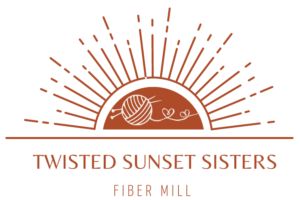FAQs
Feel free to check out the commonly asked question below for more information! We’ll continue to grow this page out as you folks sending them our way!
Processing:
Separation is an optional process that really benefits super-fine fleece, as well as fleece that contains a lot of grass/other vegetable matter (VM). Super-fine fleece can be too fragile for the picking process (which we usually rely on to break up locks and fluff up fiber before we card the fiber into roving). If the fleece is too fine, the picker will rip the fiber locks and cause little balls or bumps in the fiber called "neps." The separator allows us to do this process more gently, but is much slower and requires us to break up the locks a bit by hand before (hence the extra charge). Fleeces that contain a very high amount of VM need some extra help to remove it so that the VM doesn't end up in the roving/yarn. Fiber with a small amount of VM will likely be fine skipping this step and going directly from the picker to the carder.
We highly recommend adding the skein wash to your finished yarn ($1.50/lb). The skeins are washed in our large, industrial-sized washer with a special fiber conditioner - adds a nice clean scent to the yarn and strips out any remaining processing and spinning oils. If you're a hand-processor, this is similar to the soak and snap/thwack process that's done post-spinning to help the fibers bloom out. The result is knit-ready, soft yarn! If you opt to skip this process, I would recommend you hand wash the skeins after receiving them to remove any of the remaining oils and give them that soft, extra fluff.
Pricing & Costs:
This is a rather complex question as there are a lot of variables at play to determine an exact number: quality, quantity, farm costs, etc. But in general, one of our goals is to ensure that every fleece you profit either breaks even in processing or will produce a profit. If ever we are processing a fleece, which we have concerns that this may not be the case, we'll reach out to you to determine the next best course of action.
The following example is designed to illustrate how to calculate costs it is not a guarantee of returns. Let's pretend that you have a single pound of raw alpaca fleece you'd like processed into yarn. Your processing fees, including a skein wash and separator would work out to ~$30/pound up front.
Processing loss for an average alpaca fleece is typically 20-30%. Higher quality, well skirted alpaca will typically see < 20%. Lower quality fleeces with lots of vegetable matter or shorts could see higher losses.
This means that you'd typically get back 2 or 3 standard sized skeins of yarn (3.5 - 5 oz each). Alpaca market typically shows (2023) that a skein of yarn will earn between $20 on the lower quality end and $30 on the higher quality side. This means that your returned profit would be at $20 per skein ($40 to $60) or at $30 per skein ($60 to $90).
The reasons many farm process their raw fiber and wool into a finished goods is because it increases both size of the market you can sell that product too as well as the price per pound you can end up receiving for it. Alpaca for example you can get on average $2 per ounce ($32/lb) but the number of folks who are in the market for raw, unwashed fleeces are likely limited to hand spinners as processing and getting value from that raw material requires a fair amount of time, as well as specialized tools and knowledge.
However by investing a small amount of money up front, you can transform that raw material into yarn. Alpaca yarn being sold at $25 a skein ($6.25/oz or $100/lb) and the market size that you're selling that product into includes larger number of folks and is suitable for a larger number of crafts (ex: knitting, crocheting, weaving, fiber arts, etc)
